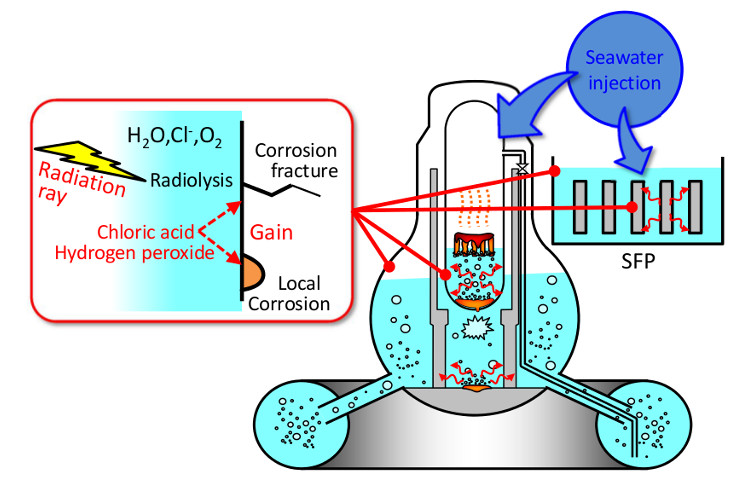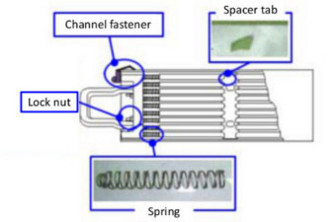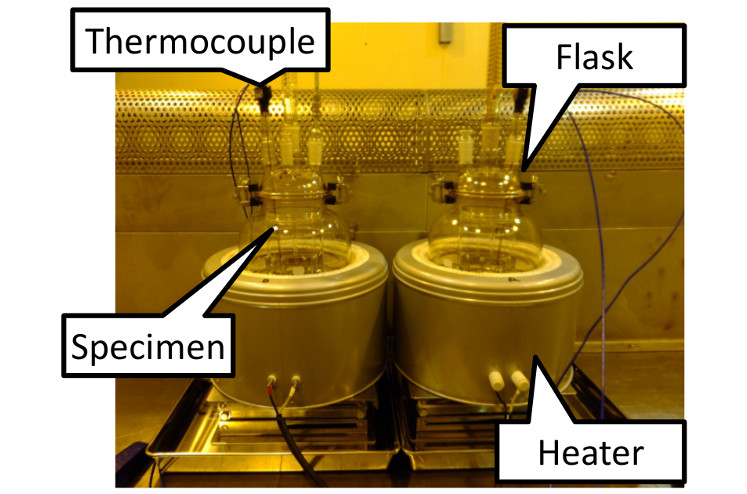Integrity assessment of reactor / fuel assembly materials
There are concerns about the degradation of various metallic materials used for fuel assemblies, spent fuel pool (SFP), reactor pressure vessel (RPV) and primary containment vessel (PCV) in the environment of gamma ray radiation and water including seawater injected during the accident. It is necessary to evaluate the degradation due to corrosion in that environment for the assessment of integrity of materials.
Long-term integrity of various metallic materials
◎ Objective
According to "Mid-and-Long-Term Roadmap towards the Decommissioning of TEPCO's Fukushima Daiichi Nuclear Power Station Units 1-4", the fuel assemblies in the spent fuel pool will be transported to a common pool at the Fukushima Daiichi NPP site for long-term storage. However, the metallic materials used for fuel assemblies or pool structure could be corroded and degraded in the environment of radiation and water including seawater, so that it is necessary to assess their integrity for safe transportation and storage.
The RPV and PCV materials may also be exposed to a similar environment, therefore it is also necessary to assess and predict the corrosion and degradation of structural integrity of RPV/PCV until the completion of removal of fuel debris.
◎ R&D activities
Regarding Zircaloy and stainless steel used for fuel assemblies, claddings and SFP, the possibilities of corrosion occurrence are being evaluated under simulated conditions of radiation level and water quality in the SFP at Fukushima Daiichi NPP. In addition, some parts of an unirradiated fuel assembly extracted from the SFP at Unit 4 were transported to the Nuclear Science and Research Institute, JAEA for the evaluation of their corrosion and degradation. The acquired information on material integrity is used for the integrity assessment of transportation and long-term storage of fuel assemblies.
The same approaches are applied to corrosion experiments of low-alloy steel and low-carbon steel used for the RPV/PCV under the simulated conditions of water quality, temperature and radiation level measured in the PCV. The anti-corrosion measures such as addition of hydrazine are also evaluated for the long-term integrity of these materials.
In addition, the analysis code is being developed to predict the radiolysis of water including seawater ingredients in order to assess the effect of seawater injection on corrosion of the SFP and RPV/PCV. Results of the analyses by code calculation will be used to evaluate the above mentioned experimental results.
◎ Related facilities

Possible effects of radiation and seawater injection on corrosion of metallic structural materials

Parts of unirradiated fuel assembly extracted from SFP at Unit 4

Corrosion examination of RPV/PCV steels under simulated conditions
This R&D contributes to part of the "Mid-and-Long-Term Roadmap towards the Decommissioning of TEPCO's Fukushima Daiichi Nuclear Power Station Units 1-4".
- (1-1) Evaluation of the Long-term Integrity of Fuel Assemblies Removed from the Spent Fuel Pool
- (2-(1)-8) Development of Technologies for Assessment of RPV/PCV Integrity







